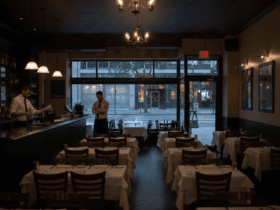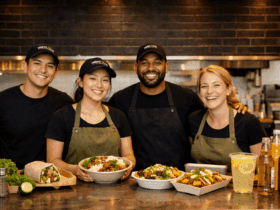If you’ve ever dreamed of owning your own business and tapping into the lucrative food industry, then you’re not alone. The world of restaurant franchising is expansive and brimming with opportunities. Food franchises account for an estimated 30% of the total franchise establishments in the U.S.
This Guide will Delve into the Intricacies of Restaurant Franchising and Answer Some Burning Questions.
What is franchising a restaurant?
Simply put, restaurant franchising is the process of granting independent entrepreneurs access to a restaurant’s brand name, business strategy and operating procedures. These entrepreneurs, known as franchisees, run their businesses under the restaurant’s name.
Understanding how it works
When a restaurant is franchised, the franchisee often pays the franchisor an upfront fee as well as recurring royalties in exchange for the ability to operate under their name and benefit from their support.
There are many factors involved in franchising a restaurant, from site selection to marketing and operations. The franchisor typically provides training, equipment specs, and, in certain cases, marketing assistance.
Is franchising profitable?
While there is no one-size-fits-all solution, several restaurant franchising studies and restaurant franchising facts indicate that franchised businesses frequently benefit from brand awareness, established processes and assistance, all of which can lead to profitability. However, success might vary depending on geography, management and franchise brand.
Exploring opportunities
The restaurant industry offers a variety of franchising options, including QSR, fast-casual, fast-food, and full-service industry segments. Let’s break down each of these segments mentioned.
- QSR (Quick Service Restaurant):
This refers to what many people commonly know as “fast food.” QSRs typically offer meals at a lower price point and focus on speed. Customers order at a counter or through a drive-thru, pay, and then receive their food either to take away or eat on the premises.
- Fast-casual:
This is a hybrid between QSR and full-service dining. Fast-casual restaurants offer food that is typically of higher quality and slightly more expensive than QSRs. The setting is more relaxed, and the interior is usually more upscale. Customers still order at a counter, but the food is often brought to their table, and the overall dining experience feels a bit more premium.
- Fast-food:
While this term is often used interchangeably with QSR, it traditionally refers to any restaurant where food preparation and service are expedited. These establishments prioritize serving food quickly, often sacrificing some aspects of quality or variety in the process.
- Full-service Industry Segment:
This type of restaurant involves a more traditional dining experience. Customers are seated at a table, provided with menus, and then order through a waiter or waitress. The food is typically more expensive, and there’s a greater emphasis on the dining atmosphere, service quality, and a broader menu selection.
Steps to start
If you are considering franchising a restaurant, there are several crucial steps and considerations to keep in mind:
01. Research:

Before you decide on a specific franchise, research the restaurant industry in your area. Identify potential competitors and assess the market demand. Learn about emerging trends and see if your potential franchise aligns with those trends.
02. Choose wisely:
Every franchise has its own set of rules, culture, and expectations. You will want to select a restaurant that matches not only your business goals but also your personal interests and values.
03. Get the facts:
Once you’ve chosen a specific franchise, gather as much information as you can about it. This includes its financial history, growth trajectory, training programs, support services, and any litigation or complaints from other franchisees.
04. Costs:
There is an initial fee to procure a franchise and this varies depending on the business. There are other costs as well. This can include:
- Royalty fees (typically a percentage of gross revenue)
- Marketing and advertising costs
- Rent or lease costs for the location
- Equipment and inventory purchases
- Training costs
05. Net worth requirements:
Some franchises require franchisees to have a certain net worth or liquidity to ensure they can handle the ups and downs of running a business, especially in the initial stages when profits might be minimal.
06. Legalities:
Always consult with a franchise attorney. They can help review the Franchise Disclosure Document (FDD), which contains essential information about the franchisor and the terms of the agreement.
07. Training and support:
Good franchisors offer extensive training and support. This can range from managerial training to customer service and even food preparation. Investigate what training and ongoing support the franchisor provides to ensure you can maintain the standards and quality of the brand.
08. Location:
The success of a restaurant often hinges on its location. Some franchisors will help you select and secure a prime spot, while others may leave that task up to you. Make sure you do a thorough analysis of potential locations, including traffic patterns, accessibility, local competition, and demographics.
09. Build a business plan:
Even if you’re buying into an established model, you’ll still need a business plan tailored to your specific location and market. This plan will help guide your operations and can also be essential if you’re seeking financing.
10. Financing:
If you don’t have the capital upfront, you’ll need to explore financing options. This might include bank loans, franchise-specific lenders, or even tapping into your personal savings or assets.
11. Operational considerations:
From hiring staff to managing daily operations, remember that running a franchise is a hands-on job. It requires dedication, time, and energy.
12. Evaluate and reflect:

As you move forward, take time to evaluate your restaurant’s performance. Use feedback from customers, monitor financial metrics, and stay in touch with the franchisor for updates and support. Furthermore, fostering a culture of continuous improvement within your restaurant is pivotal. Engage regularly with your staff, from kitchen personnel to waitstaff, to understand the intricacies of day-to-day operations. By creating an environment where everyone feels invested in the restaurant’s success, you not only enhance operational efficiency but also promote loyalty and teamwork. Using Applova’s Analytics you can get interactive data and actionable feedback about your restaurant, down to the details.
Final Thoughts
Franchising may be a rewarding endeavor, whether you’re looking for the greatest food franchises to own or simply exploring the public restaurant franchising industry. Always conduct due diligence, consult professionals, and understand market conditions before investing. The world of restaurant franchising awaits the enterprising entrepreneur, and, with the right collaboration, success will be within reach.








Leave a Reply